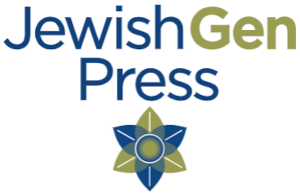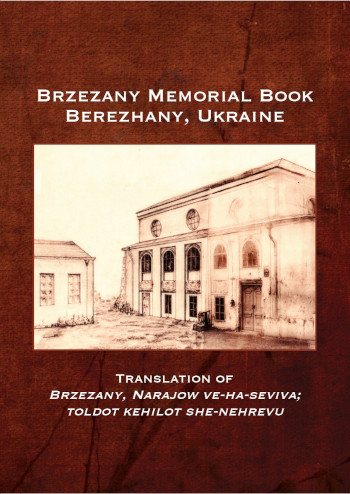

Translation of
Brzezany, Narajow ve-ha-seviva; toldot kehilot she-nehrevu
(Berezhany, Ukraine)
Published by the JewishGen Press
Editor of Original Yizkor Book:
Available from
for $43.00
Menachem Katz, Haifa, Brzezany-Narajow Societies in Israel and the United States
Project Coordinator: Moshe Kutten
Project Coordinator Emerita: Ruth Yoseffa Erez
Cover Design: Rachel Kolokoff Hopper
Layout, formatting and indexing: Jonathan Wind
Book Summary: Bruce Drake
8.5”x11” Hardcover, 682 pages with original photographs and illustrations
 |
Details:
Berezhany is situated in southeast Galicia, about 62 miles from the city of Lviv. When the Austro-Hungarian empire collapsed after World War I, the town became part of the newly-reconstituted nation of Poland. After the German occupation during World War II, the Soviets annexed it as part of Ukraine. Following the breakup of the Soviet Union in 1991, Ukraine emerged as an independent nation.
Its Great Synagogue, which still stands today, was built in 1718. The book describes its construction, history and centrality in the life and history of the Jewish community. Over the years it served as a shelter for refugees and shelter from pogroms and persecution, as the people considered the building a physical fort, and a spiritual sanctuary. It hosted community gatherings, particularly on holidays, when crowds filled every corner and spilled over into the passageway and entrance hallway.
The economic situation of Berezhany's Jews was hard for all generations which contributed to the massive Jewish emigration in the late 19th century and early 20th century. There was a small number of wealthy people and a somewhat larger middle-class made up of lawyers, physicians, Jewish government officials and some established merchants. But the bulk of the population toiled at making a living: craftsmen, small merchants, workshop apprentices, store helpers, household workers, all sorts of peddlers, market stall owners, wagon owners, porters, and others. There was a substantial portion of poor people who were dependent on public support and welfare.
The book has chapters on the town's figures and personalities with numerous profiles and brief descriptions, particularly of its rabbis but also doctors, scholars, Zionist activists and others. A separate section details the activities of the range of Zionist and political groups that were active in the town.
Prior to World War II the Jewish population in Berezhany was approximately 4,000 but refugees fleeing the Nazis swelled that number to 12,000 in 1941. The next year, some were sent to Belzec and others murdered in the city. In 1943, the last 1,700 Jews of the ghetto and labor camp were liquidated, with only a few individuals escaping.
A large part of the book's section on the Holocaust was written by Dr. Eliezer Shaklai who along with others were notified by the Germans that they had been appointed to the Judenrat who would be responsible in dealing with the Jewish population on behalf of the German authorities. His account makes clear he became keenly aware of the impossible demands of that role which the Germans used to help achieve their ends. But his main purpose is to relate the long sequence of events – the aktions, the forced labor camps, the spread of typhus -- that led to the suffering and death of the Jews of Berezhany during the three years of the Nazi occupation.
Berezhany [Rus, Ukr], Brzeżany [Pol], Brizan [Yid], Barzan, Berson, Berzhan, Brezan, Brzezhany, Bzezan, Bzhezhani, Bereschany, Berezany
Berezhany, Ukraine is located at 49°27' N 24°56' E 257 miles WSW of Kyyiv.
|
 JewishGen Press
JewishGen Press
 JewishGen Home Page
JewishGen Home Page
Copyright © 1999-2025 by JewishGen, Inc.
Updated 22 Dec 2024 by LA